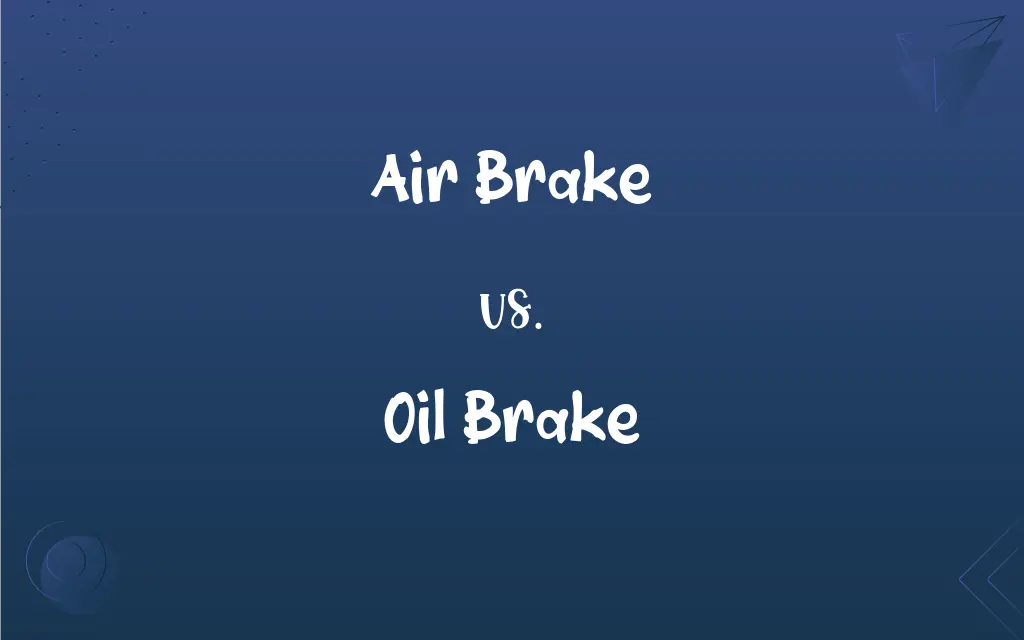Air Brake vs. Oil Brake: What's the Difference?
Edited by Aimie Carlson || By Harlon Moss || Published on January 26, 2024
Air brakes use compressed air for vehicle stopping power, commonly in heavy vehicles, while oil brakes, or hydraulic brakes, use fluid pressure for braking, typically in lighter vehicles.

Key Differences
Air brakes, utilizing compressed air to operate, are essential in heavy-duty vehicles like trucks and buses for effective stopping power. In contrast, oil brakes, also known as hydraulic brakes, use a fluid-filled system to transmit braking force, commonly found in cars and motorcycles.
The air brake system is known for its reliability in large vehicles, providing a failsafe mechanism where loss of air pressure results in braking engagement. Oil brakes, relying on hydraulic fluid, offer a more compact and responsive braking system suitable for smaller vehicles.
Maintenance of air brakes involves regular draining of air tanks to remove moisture and checking for air leaks. Hydraulic (oil) brake systems require periodic fluid changes and checks for leaks to ensure optimal performance.
In terms of complexity, air brakes have more components, such as air compressors and reservoirs, making them more complex but robust. Hydraulic brakes are simpler with fewer components, making them easier to maintain in smaller vehicles.
Air brakes are advantageous in providing consistent braking force over long distances, crucial for heavy vehicles. Hydraulic brakes, on the other hand, offer precision and smoother braking experiences, ideal for everyday driving conditions.
ADVERTISEMENT
Comparison Chart
Vehicle Type
Heavy-duty vehicles (trucks, buses)
Lighter vehicles (cars, motorcycles)
Operation Mechanism
Uses compressed air
Uses hydraulic fluid
Maintenance Needs
Draining air tanks, checking for air leaks
Changing hydraulic fluid, checking for leaks
System Complexity
More components, complex
Fewer components, simpler
Braking Experience
Consistent force, suitable for long distances
Precise and smooth, ideal for everyday driving
ADVERTISEMENT
Air Brake and Oil Brake Definitions
Air Brake
Air brakes use compressed air to apply pressure to the brake pad.
The truck's air brakes engaged smoothly as it approached the red light.
Oil Brake
Oil brakes require fluid changes for maintenance.
Regular oil brake fluid changes keep the braking system in optimal condition.
Air Brake
They are essential for heavy-duty vehicles for safe stopping.
Buses rely on air brakes for their efficient and reliable stopping power.
Oil Brake
Oil brakes use hydraulic fluid to transfer braking force.
The car's oil brakes responded instantly when the driver pressed the pedal.
Air Brake
They require regular maintenance for optimal performance.
The mechanic checked the air brake system for any signs of leaks or damage.
Oil Brake
They offer precise braking control and responsiveness.
The motorcycle's oil brakes allowed for precise speed adjustments.
Air Brake
Air brakes are known for their durability and strength.
The air brakes provided consistent stopping power even under heavy load.
Oil Brake
They are common in personal vehicles for smooth braking.
Oil brakes ensure a smooth and controlled stop in urban driving conditions.
Air Brake
Air brakes include a failsafe mechanism for safety.
The air brakes automatically activated when the system detected a pressure drop.
Oil Brake
Oil brakes are simpler and compact in design.
The compact design of oil brakes makes them ideal for small vehicles.
FAQs
What is an oil brake?
Oil brakes, or hydraulic brakes, use fluid pressure for braking in lighter vehicles.
Where are air brakes commonly used?
In buses, trucks, and other heavy-duty vehicles.
What's the main advantage of air brakes?
Reliable stopping power for heavy vehicles.
What is an air brake?
Air brakes use compressed air to apply braking force, mainly in heavy vehicles.
How do oil brakes function?
By using hydraulic fluid to transmit brake force.
How do air brakes work?
They use air pressure to apply the brakes.
Are air brakes complex to maintain?
They have more components, so maintenance can be more involved.
Can air brakes be used in small vehicles?
They are generally not practical due to their size and complexity.
What maintenance do oil brakes need?
Regular fluid changes and leak checks.
What vehicles typically have oil brakes?
Personal cars, motorcycles, and light vehicles.
Why are oil brakes preferred in cars?
For their smooth and responsive braking.
How does weather affect air brakes?
Cold weather can cause moisture in air brakes to freeze, affecting performance.
What is the risk with oil brake leaks?
Leaking can lead to reduced braking efficiency or failure.
Can oil brakes be environmentally hazardous?
Hydraulic fluid leaks can be harmful to the environment.
How responsive are oil brakes?
They offer immediate and precise braking control.
Are oil brakes suitable for heavy vehicles?
Not typically, as they may not provide sufficient force for large loads.
Are air brakes environmentally friendly?
They don't use fluids, so there's no risk of fluid leaks.
Do air brakes fail safely?
Yes, they are designed to engage brakes if air pressure is lost.
Do oil brakes have any weather-related issues?
They are less susceptible to weather, but fluid quality can degrade over time.
What happens if an air brake leaks?
It can cause brake failure, thus regular checks are crucial.
About Author
Written by
Harlon MossHarlon is a seasoned quality moderator and accomplished content writer for Difference Wiki. An alumnus of the prestigious University of California, he earned his degree in Computer Science. Leveraging his academic background, Harlon brings a meticulous and informed perspective to his work, ensuring content accuracy and excellence.
Edited by
Aimie CarlsonAimie Carlson, holding a master's degree in English literature, is a fervent English language enthusiast. She lends her writing talents to Difference Wiki, a prominent website that specializes in comparisons, offering readers insightful analyses that both captivate and inform.































































